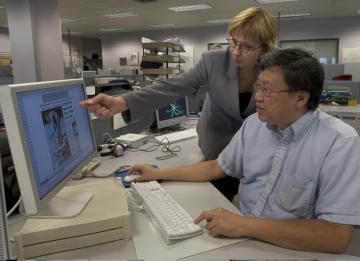Valuing the “relentless quest for knowledge”
- Lucinda Chodan

Aeronautical design. The relationship between literature and religion. Semiconductor crystal growth. Those disparate topics—and their impassioned advocates at the university—are among the dozens of fascinating subjects I have encountered as a member of the selection committee of the Craigdarroch Research Awards.
For someone who has an undergraduate degree in education and post-graduate credits in literature and classics, it has sometimes been a stretch. Each nomination is accompanied by reams of documentation, and the fields of research are often arcane (my high school physics teacher would be dumbfounded to learn that I had ever contemplated the term “liquid phase electroepitaxy”). But the process has been well worth the candle.
Every year, it has been a reminder of the value of an institution like the University of Victoria. The medal recipients are among the best academics in their fields, not just in Canada but internationally, and their research has contributed to the betterment of society.
Three examples demonstrate how. That semiconductor crystal growth I mentioned earlier? It’s integral to the functioning of cell phones and solar panels, among other things, and the research of Dr. Sadik Dost, last year’s gold medal winner, has played an important role in their development.
Dr. Cecilia Benoit, a two-time medal-winner, has used community-based research to improve the lives of such vulnerable populations as First Nations women, homeless youth and sex workers. And Dr. Nigel Livingston was honoured last year for his work with CanAssist, an uplifting program that engages hundreds of volunteers inside and outside the university to help develop services for people with special needs.
Those three individuals are among more than a dozen medal recipients I have had the great privilege of selecting. And there are at least another dozen nominees whose research is making similarly important contributions to our understanding of our community, our planet, our universe.
The Craigdarroch awards are an important way for the university to reinforce the value it places on research to its academic staff. But the awards are also an opportunity to tell the larger community what is happening on campus and why it matters.
Expressions like “town and gown” and “ivory tower” are sometimes used to draw a line between the larger community and institutions of higher learning. The latter is especially dismissive—it suggests that the university is somehow out of touch with the real world.
These awards give lie to that suggestion. The work of each medal recipient has had an impact on our lives and those of our fellow citizens around the world. The awards ceremony gives the university a chance to convey that message to the larger community.
For me, the process of selecting the recipients of the Craigdarroch awards has also been a reminder of humankind’s restless, relentless quest for knowledge. As Shakespeare wrote in Hamlet, “What a piece of work is a man, how noble in reason, how infinite in faculties.”
The rest of the quotation is just as stirring—you can look it up yourself with a click of the mouse, thanks to a beautiful and comprehensive website called Internet Shakespeare Editions, the brainchild of Dr. Michael Best, one of the Craigdarroch recipients this year.
It has been an honour to serve on the awards selection committee for the past three years, and I am delighted to be returning again next year as the “civilian” on the committee. And if anyone is interested in tips on liquid phase electroepitaxy, I know just the person to talk to.
Lucinda Chodan is editor-in-chief of the Times Colonist. For the last three years, she has served as the nominee of the President and the Vice-Chancellor on the Craigdarroch Research Awards selection committee.

